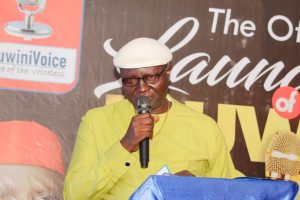Editorial
ISAAC JASPER ADAKA BORO AND THE METAPHORICAL 12-DAY REVOLUTION.

By Prof. Ben Binebai
Today we embark on a journey through the annals of history, to unravel the mystique of the 12-Day Revolution, a central event in the Ijaw freedom struggle. Like a phoenix rising from the ashes, Isaac Jasper Adaka Boro, an Ijaw freedom fighter, declared the Niger Delta Republic in 1966, igniting a flame that would burn for generations. He is a Nigerian nationalist and military officer. Isaac Adaka Boro was born on September 10, 1938, in Oloibiri, Bayelsa State, to Pepple Boro, a school headmaster. He excelled academically, earning his First School Leaving Certificate with distinction and later passing the West African School Certificate Examination at Hussey College, Warri, in 1957. Boro’s activism began as a student leader at the University of Nigeria, Nsukka, where he championed for the rights of minority groups. Isaac Boro’s 12 day revolution was ignited by ijaw conditions of subalternity and Sisypheannism in Nigeria.
The Ijaw Struggle: A Saga of Subalternity
Ijaws have been subalterns, subjected to the whims of colonial governance to this era of post-colonial governmentality under the control of fellow countrymen. In Greek mythology, Sisyphus was cursed to roll a massive boulder up a steep hill, only for it to roll back down each time he reached the top, forcing him to start anew. This cycle of pushing the boulder up the hill, only to see it roll back down, is a potent symbol of the Ijaw people’s struggles Like a Sisyphean task, we have pushed the boulder of oppression up the mountain, only to see it roll back down, crushing our spirits.. Just like Sisyphus, the Ijaw nation has faced numerous challenges and setbacks in her quest for justice and equality. Despite efforts to push forward, we often find ourselves back at the starting point, with little to show for our struggles. This Sisyphean connection between Ijaw and Sisyphus can be seen in various aspects of the Ijaw struggle, including:
1. Environmental degradation: Despite their efforts to protect their environment, the Ijaw people continue to suffer from oil spills, gas flaring, and other forms of environmental degradation.
2. Marginalization: The Ijaw people have been marginalized and excluded from decision-making processes, despite their significant contributions to Nigeria’s economy.
3. Lack of infrastructure: Despite their efforts to demand better infrastructure, the Ijaw people continue to suffer from poor roads, inadequate healthcare, and lack of access to basic necessities.
4. Violence and militarization: The Ijaw people have faced violence and militarization, with their communities often being the site of conflicts between security forces and militant groups.
I SAAC Boros 12 day revolution is also influenced by preceding phases of ijaw struggle in which Ijaw towns were destroyed along with their vocal voices of liberation in one form or the other. These stages have produced four period set of liberation fighters. From 1895 when King Koko took up arms against the oppressive Royal Niger Company of the British to this era of the struggle; the Ijaws of the Niger Delta have put in 130 years of liberation struggle. The first period of struggle lasted for 45years (1895-1940) the period from Dappa Biriye 1940 to Isaac Boro revolution of 1966 took 26 years. From the Boro revolutionary epoch of 1966 to the era of the Ijaw youth’s declaration of freedom at Kaiama up to this time (2025), the struggle has recorded another 55years.
Today, let us strongly remember the first people who fought for the liberation of the Ijaw nation. They were the traditional rulers and prominent chiefs of the colonial era. The Opobos under king Jaja, the Nembes under King Frederick Williams Ofrimalekeleke Koko, King Ibanchuka of Okrika, the Oborotu of Iduwini under the military command of Taiyan, Ayakoromo under the Ondukus and Agias and Chief Ambakederemo of Kiagbodo. The setting of this period in history is the 19th and 20th centuries. Precisely between the early 1880s to the first four decades of the 20th century. These struggles brought nothing but devastation to Ijaw clans and communities.
Let us also remember educated Ijaw sons, patriots and nationalists Ernest Ikoli, a veteran politician and journalist, Chief Harold Dappa Biriye, Chief F.H.E. Brisibe, OFR, Chief George Albert Weikezi, Harris Ozeke, Prince H E. Odoundiri, Chief Edwin Kiagbodo Clark, , Sam Timinipre Owonaru, Captain Nottingham Dick, His Royal Majesty King Alfred Diete Spiff Pastor power Ziakede Aginighan Professor Christopher Dime, Professor Kimse Okoko, Dr. Amba Ambaowei, Alaowei Broderick Bozimo, Chief DSP Alamieyeseigha, Frank Opigo, Captain George Amangala, Chief Anthony Francis Oladipo Engurube, Barrister Oronto Douglas etc Their approach was characterized by political representation and intellectual persuasion.
Why Isaac Boro declared Niger Delta Republic:
On February 23, 1966, Boro declared the secession of the Niger Delta from the rest of Nigeria, citing neglect and underdevelopment despite being the hub of oil production. He formed the Niger Delta Volunteer Force, composed of young men from various Ijaw clans. The revolution lasted 12 days before federal forces defeated them, and Boro was jailed for treason.
The 12 day revolution was an epic battle against the politics to control the liquid gold economy by the Nigerian political hegemonic philistinic and ethnocentric collaborators. Isaac Boro’s declaration has a separatist spirit, temper and manifesto. This is because it is not a struggle for recognition within Nigeria but a struggle to own and operate a separate independent nation. This present phase of freedom struggle is a further embodiment of the proverbial 12 days Revolution of Boro. The 12 days revolution after all is twelve days in time length but it has countless generational penetration. The revolution that started in 1966 is still on today.
Primarily, the 12 day revolution is about neglect and underdevelopment. Despite being the hub of oil production in Nigeria, the Ijaw area is neglected. This negligence resulted in pathological and wide spread poverty, environmental degradation and lack of basic infrastructure. It was further propelled by resource control, greater control of the resources of Ijaw nation which advocated for a more equitable distribution of revenues derived from the areas natural resources.
The 12 days revolution also highled the struggle for minority and oppressed peoples rights and privileges in Nigeria, seeking greater recognition, representation and liberties. The Revolution is also about expression of political and economic anxieties. The best way to explain this is the awareness of the strong feeling of marginalisation, balkanisation, exclusion and subalternisation. The revolution is also inflamed by Ijaw national sentiment. It was driven by a strong sense of nationalism and a desire for self-determination. He sought to assert the republics autonomy and control over its god given resources.It a struggle based on the vision for Ijaw self-actualisation through the use of arm. Focussing on separatism nationalism. Interestingly, Adaka Boro’s struggle produced Boroism as: A philosophy, ideology, theory, principle, movement, politics, psychology And Literature of Ijaw struggle which has sustained the Ijaw struggle to date. It a revolution based on control of the oil in Ijaw land. ,
Observably, oil, is the why Nigeria is united by disunity and disunited by unity, it is what makes Nigeria great; ironically, it is what disunites Ijaw and her neighbours. It is the reason for the nation’s development and the reason for the underdevelopment of the Niger Delta. It is the reason for the unity of major ethnic nations and the reason for the criminal balkanization of the Ijaws. It is the reason Nigeria is tyrannised by lopsided beauty and judgement, held firmly by titanic and acidic corruption and corrupted pathologically by greedy totalitarianism. It is the reason for many forms of violence – political, ideological, historical, psychological, geographical, and epistemic violence. It is the reason for Ijaw subalternity and ‘Sisypheannism’, the reason for perpetual political domination, economic cannibalism, and what Esiaba Irobi called political attackancy in his seminal drama, and Hangmen also die (Binebai 4).
The Niger Delta which was declared a republic by Isaac Boro is hitherto, a hotbed for major confrontations between its people and the Nigerian military. Its freedom fighters have experienced extrajudicial executions, arbitrary detentions, and brutal violation of rights to freedom of expression, association, and assembly due to protests against the activities of multinational companies and hegemonic subjugation. The scope of this lecture mandates me to reflect also on the gains and pains of the Isaac boro 12 day revolution.
Gains of the 12 days Revolution
It brought about Resource Control Awareness: Boro’s revolution raised awareness about the need for resource control and equitable distribution of oil revenue. Boro’s 12 days revolution inspired future generations, including Ken Saro-Wiwa, P.Z Aginighan DSP Alamieyeseigha. The revolution highlighted also the struggles of minority groups in Nigeria and the need for greater recognition and representation. It contributed to the creation of Rivers state and even Bayelsa State. It gave cultural identity and agency to the ijaw nation. It prepared the way for the emergence of new set of dependable leaders like Tompolo and other Niger Delta activists.
As a researcher, I have sought to capture the essence of Tompolo’s remarkable story, plaiting together historical context, and political analysis to create a distinctive representation of a leader who has defied conventions and redefined the boundaries of possibility. I explored the central instants, judgments, and relationships that have fashioned Tompolo’s trajectory, and to distill the lessons and insights that have made him an iconic symbol in contemporary Nigerian politics.
Pains of the 12 days Revolution
Loss of Life: Boro’s revolution was short-lived, and he was eventually killed in action during the Nigerian Civil War in 1968. Several towns and villages across the ages have been burnt and destroyed and many lives lost.
Despite Boro’s efforts, the Niger Delta region continues to face marginalization, environmental degradation, poverty and unfulfilled Promises: The federal government’s promises of development and resource control remain unfulfilled, fueling ongoing agitation in the region. Let me state clearly that Ijaw is strongly facing 30 problems in Nigeria. Betrayal, Inter-ethnic wars, discrimination, segregation, nepotism, ethnocentrism, sectionalism, Subalternization. Underdevelopment, invisibility, poor leadership, environmental degradation Oil pollution, gas flaring, lack of infrastructure, unemployment, poverty, marginalization, exclusion from decision-making processes, cultural erosion, language endangerment, historical injustices, land grabbing, displacement from ancestral lands, human rights abuses, suppression of self-expression, limited access to education, inadequate healthcare, corruption, institutionalised oppression.
Some of the major Unending Problems of Ijaw Nation are: Political balkanisation- divided into several states for oppression and exploitation, economic subjugation and dislocation- we cannot control our wealth, ecological degradation, post-colonial governmentality- how structures of power regulate and undermine Ijaw growth in Nigeria, Marginalisation- we suffer discrimination, limited access to education, health care, underrepresentation, legal legislative and constitutional tyranny. Subalternisation – social exclusion Invisibility, Lack of voice and agency. These problems are interconnected and have been perpetuated by a complex web of historical, economic, and political factors. Addressing these challenges will require a sustained and collective effort from the Ijaw people, their neighbors, and the Nigerian government.
The Ijaw experience of Sisyphean connection highlights the need for a new approach, one that recognises the futility of the current cycle of struggle and seeks to break free from it. It emphasizes the importance of finding new ways to address the challenges faced by the Ijaw people, rather than simply pushing the same boulder up the hill. By acknowledging the Sisyphean nature of Ijaw struggle, we can begin to explore new strategies and approaches that can help them achieve their goals and break the cycle of futility. As a subaltern tribe, the Ijaw people have been marginalized and excluded from positions of power and influence. Our voices are often silenced or ignored, and our concerns are dismissed as inferior or unimportant. This subaltern status has contributed to our Sisyphean existence, where we are forced to repeatedly push against the weight of oppression, only to see our efforts seemingly undone.
The need for new methods for the Ijaw freedom struggle.
Apart from: – Shift from Armed struggle, armed confrontation to non-violent civil disobedience, broadening the support base by building a more inclusive movement beyond the Ijaw ethnic nationality, efforts towards sustainable development and environmental justice, emphasis on political strategies. Through lobbying and institutional channels, leveraging legal and institutional channels, internationalization of the struggle by seeking support and solidarity from the global community. And embracing religion, the religion of the Ijaw ethnic nationality, I propose Ijaw psychological unity, it will bring strength in numbers, coordinated strategy, shared vision and purpose, resource mobilisation, international support, collective resilience against suppression, bridging differences and presenting a cohesive front.
In the annals of Nigerian history, few events have captured the essence of resistance and defiance as the 12-Day Revolution of Isaac Adaka Boro. This pivotal moment in the Ijaw struggle for self-determination and resource control continues to inspire generations of activists, scholars, and freedom fighters. As we reflect on the gains and pains of this revolution, we are reminded of the enduring power of courage, conviction, and collective action in the face of oppression. By acknowledging Ijaw as a subaltern Sisyphean tribe, we can begin to understand the depth of our struggles and the need for solidarity and support. It emphasizes the importance of listening to our voices, amplifying our concerns, and working towards a more just and equitable society.
The 12-Day Revolution of Isaac Adaka Boro may have been short-lived, but its impact on the Ijaw struggle and Nigerian history is indelible. As we honour the legacy of this courageous leader, we are compelled to continue the fight for justice, equality, and self-determination. May the spirit of Boro’s revolution inspire us to build a more just and equitable society, where the rights and dignity of all people are respected and protected. The revolution may be over, but the struggle continues.
Voice of the Niger Delta, 2021.
Editorial
Is Dubai A Country? Inside the Seven Kingdoms of the United Arab Emirates

By: Editorial Team
The United Arab Emirates (UAE), often hailed as a beacon of modern development in the Middle East, is a federation of seven emirates—each with its own distinct history, ruler, and cultural identity. Since its unification in 1971, the UAE has stood as a rare example of how traditional monarchies can collaborate to build a stable and globally respected nation.
At the heart of the federation lies Abu Dhabi, the capital and largest emirate, known for its vast oil wealth and political influence. The Al Nahyan family, which leads Abu Dhabi, has played a central role in shaping the UAE’s national vision and foreign policy. The current President of the UAE traditionally comes from this emirate, underscoring its leadership within the union.
Dubai, the shining star of the federation, represents ambition and innovation. Under the leadership of the Al Maktoum family, Dubai has transformed from a desert outpost into a global hub for finance, tourism, and technology. Its breathtaking skyline, led by the Burj Khalifa, has become a symbol of Arab progress and resilience.
Moving beyond the two powerhouses, Sharjah distinguishes itself as the cultural and educational capital of the UAE. Led by the Al Qasimi family, it has preserved the emirates’ artistic heritage while promoting academic excellence through its numerous universities and museums.
The smaller emirates-Ajman, Umm Al-Quwain, Ras Al Khaimah, and Fujairah-each add unique character and strength to the federation. Ajman, the smallest, thrives on trade and manufacturing; Umm Al-Quwain offers a peaceful charm along its quiet shores; Ras Al Khaimah, nestled against the Hajar Mountains, is known for its natural beauty and growing industrial base; and Fujairah, facing the Gulf of Oman, plays a strategic maritime role in the region’s economy.
Despite their differences in size and resources, the seven emirates remain bound by shared values, mutual respect, and visionary leadership.Their collective success story reflects not only unity but also the ability to balance tradition with progress.
Over five decades after its founding, the UAE continues to prove that cooperation among monarchies can yield a modern, forward-looking state-one that honors its past while boldly stepping into the future. The federation’s model of governance offers an enduring lesson in leadership, stability, and nation-building in a region often defined by division.
Photo Credit: shuterstock
Editorial
The Modern Avatar of Agadagba

Editorial – IduwiniVoice
Government Oweizide Ekemupolo is 4th Century descendant of The progenitors of the Oru tribe, the archetypal Ijaws, who settled in the central Niger Delta and over time, who developed and spread to the entire Niger Delta. He his an embodiment of the ancient and modern ways and forces of the ijaw ancestral greats, ruled my ancient spiritual and human laws, a man and a superman.
Prior to 1600 AD, the Ijaws first and formally formed city-states on their island of abode in Central Niger Delta. The city-states were named Agadagba-bou, Isomou-bou, and Opugla-bou. The popular city-state was called Agadagba-bou, which, according to history, flourished for 400 years until it got abandoned in 1050 CE. That was the period Ijaw people migrated within the central Niger Delta and spread to the Western and Eastern Niger Delta.
Agadagba-bou, Isomou-bou, and Upugla-bou, which represented the Ijaw civilization at the historical island, long before it was named Wilberforce Island, had cultural, spiritual, linguistic, and occupational homogeneity.
They were all worshippers and believers of the sky God. The sky God that the Ijaws call today, even from ancient times, is Egbesu. It is believed that the Wilberforce Island was known as a forest named after Agadagba, the most powerful chief priest of Egbesu, who also doubled as the military general of the Izon nation.
Agadagba-bou, as a nomenclature, derives its bearing from Agadagba, the chief priest and generalissimo who once reigned on the Wilberforce Island. It is certain that the island hosted the Ijaw nation long before the time of Agadagba because Agadagba was appointed a chief priest and military general during his time by a potentate ruler of Ijaw nation.
In the primordial mists of time, Agadagba, the illustrious military general and chief priest of Egbesu, strode forth from the hallowed grounds of Agadagbabou, his footsteps echoing through the annals of Ijaw history. This revered figure, a paragon of martial prowess and spiritual wisdom, embodied the dual essence of his people, wielding the sword and the sacred staff with equal aplomb. The whispers of the ancients tell us that Agadagba’s reign predated the 1600 AD, a bygone era when the Ijaw nation thrived in harmony with the rhythms of the Niger Delta.
Agadagbabou, the cradle of Ijaw civilization, slumbers beneath the weight of centuries, its sacred soil serving as the final resting place of the ancestral spirits. Here, the venerable dead lie entombed, their ethereal essences lingering, awaiting the supplications of their descendants. Alas, the diaspora of the Ijaw people has occasioned a lamentable disconnection from these archetypal forebears, a severance that has hindered the unfettered flow of ancestral blessings, those numinous benedictions that are the birthright of every society.
For it is an immutable truth that the progress of a people is inextricably linked to the approbation of their ancestors.
The epochs have passed, and Agadagba’s terrestrial sojourn has long since drawn to a close, yet the imperishable essence of this legendary figure endures, awaiting reification in the mortal coil. Behold, 4.18 CENTURIES AFTER AGADAGBA, PRICESELY FOUR CENTURIES PLUS, in this our age, Government Oweizide Ekemupolo, a worthy scion of the Ijaw nation, has arisen, invested with the sacred mantle of Egbesu’s chief priest and military general. The symmetries are striking, the correspondences unmistakable: Ekpemupolo stands forth as the avatar of Agadagba, a reincarnation of the primordial hero, reborn to reclaim the lost patrimony of his people.
As we gaze upon Ekpemupolo, we behold the rekindled flame of Agadagba’s indomitable spirit, a fiery essence that refuses to be extinguished. The mythopoeic imagination whispers secrets in our ear, intimating that this modern-day embodiment of Ijaw valour and spirituality is, in truth, a Priest of the ancient mysteries, a hieratic vessel ordained to restore the pristine glory of Agadagbabou and reestablish the vital link between the living and the ancestral dead.
Thus, the epicycle of time turns full circle, as the reincarnated Agadagba, in the person of Ekpemupolo, strides forth to reclaim his rightful place within the sacred precincts of Ijaw tradition. The word is a witness to his spiritual and endeavours which catalyse a renaissance of the Ijaw spirit, rekindling the ancestral fires that burn bright within the collective unconscious of this venerable people, and guiding them toward a future illuminated by the radiant glow of their archetypal forebears.
As Tompolo’s efforts continue to bear fruit, Nigeria’s economic landscape is transformed, and the nation’s people reap the benefits of his tireless endeavours. His legacy will forever be etched in the annals of Nigerian history, a shining testament to the power of visionary leadership and unwavering dedication to the nation’s progress.
Benedict Binebai is a Professor of African Literature, a Social Conscientizer, and a Critic of outstanding repute.
(c) IduwiniVoice
Editorial
A Magnificent Gesture of Philanthropy: Tompolo’s Landmark Donation 10 Billion Naira to Delta State Government

Editorial
Chief Tompolo’s most generous bestowal of 10 billion naira upon the Delta State Security Fund is a magnificent affirmation of his steadfast devotion to the betterment of his beloved homeland. This munificent act not only underscores his profound solicitude for the well-being of the citizenry, but also serves as a sonorous confirmation of his dedication to the edification of the nation.
This magnificent donation bespeaks Chief Tompolo’s perspicacious vision for a Delta State wherein the territorial integrity, individual safety, and proprietary rights of its inhabitants are zealously safeguarded and protected. For it is an immutable truth that security constitutes a fundamental pillar for peaceful and progressive human existence, and a people that get security right are a people who enjoy prosperity, stability, and tranquillity. His largesse constitutes a clarion call to all right-thinking Nigerians to emulate his exemplary conduct, thereby contributing to the realisation of a more stable and prosperous nation.
As a private individual, Chief Tompolo’s remarkable munificence distinguishes him as a true architect of society, a philanthropist of discerning taste, and a stalwart champion of both private and public institutions. His actions evince a profound comprehension of the intricate nexus between security, patriotism, and nation-building, and serve as a shining exemplar for others to follow.
In the pantheon of benevolent figures, Chief Tompolo’s deed resonates with the selfless generosity of mythical beings like Prometheus, who defied the gods to bestow the gift of fire upon humanity, or Hercules, who cleansed the Augean stables to bring prosperity to the land. Like these fabled heroes, Chief Tompolo’s philanthropy emanates a profound sense of altruism, illuminating the path towards a brighter future for the people of Delta State.
By this singular act, Chief Tompolo has floated a most compelling narrative that the Ijaw nation, and indeed all ethnic groups in Nigeria, have a critical role to play in shaping the country’s destiny. His donation is a puissant statement that the resources and talents of Nigerians, regardless of their region or ethnicity, can be harnessed to forge a more united, secure, and prosperous nation, and that the Ijaw people, in particular, are committed to contributing to the construction of a brighter Nigerian picture.
Chief Tompolo’s unprecedented gesture inaugurates a new paradigm of leadership for the Ijaw nation, one that radiates an unparalleled aura of generosity, vision, and selflessness. This luminous exemplar of leadership kindles a guiding light, illuminating a path towards a more prosperous, equitable, and enlightened future for the Ijaw people, and serves as a resplendent model for leaders across Nigeria and beyond, demonstrating that true greatness is measured by the ability to uplift and empower one’s community.
Benedict Binebai is a Professor of African Literature, Public Speaker, and a renowned critic of intellectual acclaim.
(c) IduwiniVoice






